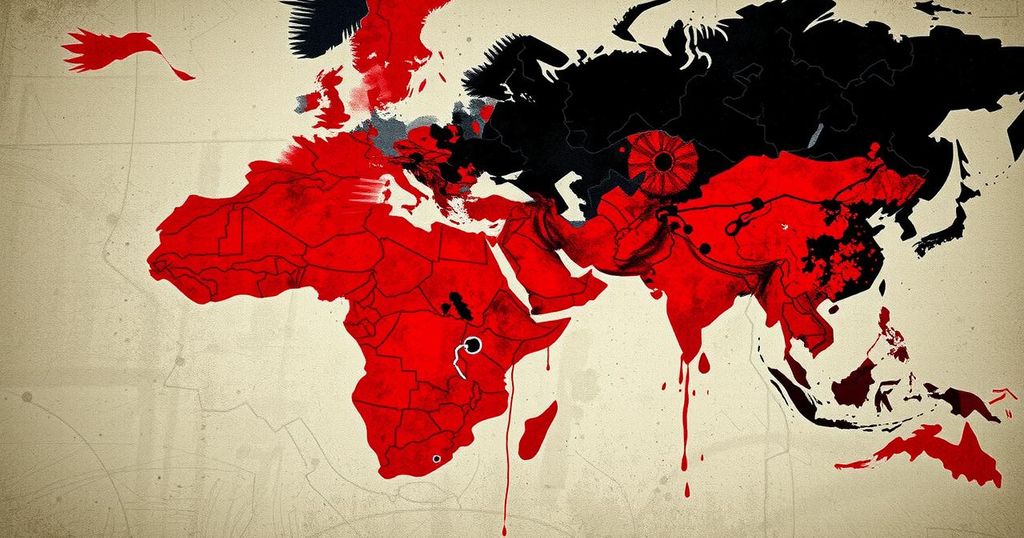The M23 militia, supported by Rwanda, has captured key cities in the DRC, seeking to reshape the region’s geopolitical landscape. Their resurgence is driven by local grievances and Rwanda’s strategic interests. Tensions are escalating not only with Burundi but also in Uganda, as the situation threatens to ignite broader conflicts. International pressure is essential to restore stability and address the humanitarian crisis.
In late January and early February, the M23 militia seized control of Goma and Bukavu, two critical cities in the eastern Democratic Republic of Congo (DRC). The Rwandan-backed group now commands a territory comparable to the size of Connecticut, signaling a bold attempt to reshape the geopolitical landscape of Africa’s Great Lakes region by establishing local administrative control.
The M23 militia, which first arose in 2012 before being dismantled in 2013 through international efforts, has resurfaced with ambitions that surpass its stated goal of safeguarding the Rwandophone community, particularly the Tutsi. The group is closely aligned with Rwandan interests, striving to enact a regime change in Kinshasa through its political arm, the Alliance du Fleuve Congo (AFC).
The resurgence of M23 in November 2021 was fueled by grievances against the Congolese government, primarily concerning unfulfilled commitments to militia veterans, alongside Rwanda’s apprehensions regarding its regional stakes. Not only does Rwanda view the Democratic Front for the Liberation of Rwanda (FDLR) as a persistent security threat, but it also aims to secure its economic interests in eastern DRC, where it sources significant quantities of gold.
Rwanda’s military activity in the region is further complicated by neighboring nations, Uganda and Burundi, intensifying their military operations against insurgencies, thus compelling Rwanda to bolster its influence through M23. Estimates suggest that Rwandan troops have been actively involved in the DRC, with an increase in casualties among civilians, alongside a dire humanitarian situation resulting in the displacement of three million individuals.
Rising tensions with Burundi have caused alarm as accusations fly between the two nations concerning support for rebel factions. The border has closed, with Burundian President Évariste Ndayishimiye openly preparing citizens for potential conflict against Rwanda, which perceives regime change in Burundi as a plausible policy objective.
Uganda, sharing economic incentives in eastern DRC, maintains a complex relationship with Rwanda and has adopted an ambiguous stance amid the M23 conflict. While there have been reports of Ugandan support for M23, the Ugandan army has concurrently deployed forces in the region, further complicating the dynamics in eastern DRC.
President Felix Tshisekedi’s grip on the region appears to be waning, exacerbated by the withdrawal of Burundian military support. The situation is marked by an increase in internal ethnic and political tensions, which may parallel the disastrous Second Congolese war of 1998, known for its devastating toll on life and stability.
The urgency for international intervention is highlighted, as previous international pressure, particularly from the United States, played a crucial role in curbing M23’s initial advances. Tshisekedi’s administration seeks to rekindle this support amid a foundation built on resource-driven military cooperation promises, yet these efforts mingle with perceptions of desperation. Recent sanctions on Rwandan officials signal a shift, but the complexity of diplomatic negotiations demands escalating pressure on Kigali.
As the possibility of greater regional conflict looms, the time for decisive international action is dwindling, raising concerns regarding stability and peace within the Great Lakes region. The imminent threat posed by M23’s consolidation in eastern DRC catalyzes the need for a cohesive strategy to restore order and prevent further humanitarian crises.
In conclusion, the situation surrounding the M23 militia and its backing by Rwanda poses significant challenges for the Democratic Republic of Congo and the surrounding region. With rising tensions in Burundi and Uganda, as well as deteriorating conditions within Congo, the complexities of geopolitical interests threaten to create a larger conflict. Notably, the urgent need for international pressure is paramount to deter further escalation, restore stability, and address the humanitarian crisis that has emerged. The engagement of the United States and other powers will be critical in navigating the political landscape and holding accountable those responsible for the violence and upheaval in the area.
Original Source: responsiblestatecraft.org






